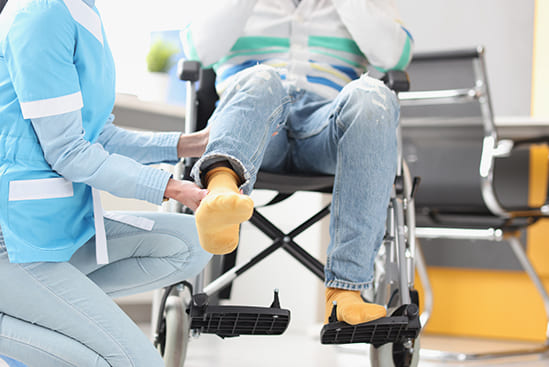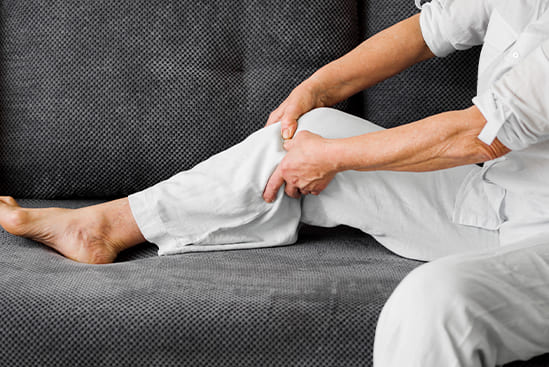
Synapse Physiotherapy
Is Dry Needling Near Me Safe? What You Need to Know
When searching for relief from muscle pain or tightness, you might have come across a treatment called dry needling. But before you book an appointment, you probably have one important question: Is dry needling near me safe? In this article, we’ll dive into the safety of dry needling, how it works, and what you need to know before deciding if it’s the right choice for your pain management.
What is dry needling?
Dry needling, also known as trigger point dry needling or intramuscular stimulation (IMS), is a specialized treatment performed by healthcare professionals, including physical therapists, physicians, chiropractors, and sports medicine specialists. While some acupuncturists argue that dry needling is based on traditional acupuncture, others view it as a modern version of trigger point injections, minus the use of medication. This evidence-based method is mainly used to alleviate muscle pain, tension, and dysfunction by targeting myofascial trigger points—tight, knotted bands of muscle that can cause pain and limit movement.
Benefits of Dry Needling
- Pain Relief: By targeting trigger points, dry needling effectively alleviates muscle pain and discomfort in areas like the neck, back, shoulders, and hips. It helps deactivate painful muscle knots, providing lasting relief.
- Improved Range of Motion: Releasing muscle tightness enhances flexibility and movement, making it especially beneficial for athletes, those recovering from injuries, and individuals with mobility challenges.
- Enhanced Blood Flow: Needle insertion promotes increased circulation to the affected muscles, aiding faster healing, reducing inflammation, and supporting overall tissue repair.
- Muscle Relaxation: Dry needling reduces muscle tension and stiffness, preventing spasms and offering a deep sense of relaxation and relief.
- Faster Recovery: By addressing the underlying cause of muscle pain, dry needling speeds up recovery from injuries, overuse conditions, and post-exercise fatigue, helping individuals get back to their daily routines sooner.
- Improved Nerve Function: Studies suggest that dry needling can enhance nerve communication, boosting muscle control, reducing nerve-related pain, and supporting overall neuromuscular function.
What to Expect During and After a Dry Needling Session
During the Dry Needling Session:
A trained practitioner will carefully insert thin, sterile needles into specific muscle trigger points to release tension and relieve pain. You may experience a mild prick or slight discomfort upon needle insertion, followed by a muscle twitch—an involuntary contraction of the muscle, which indicates that the trigger point has been successfully targeted. The needles will remain in place for a short period, ranging from a few seconds to several minutes, depending on your treatment plan. The practitioner may gently manipulate the needles to enhance relaxation and improve pain relief. While mild soreness or tingling is possible, the procedure is generally well-tolerated and does not cause significant pain.
After a Dry Needling Session:
- Mild Muscle Soreness: It’s normal to experience slight tenderness or soreness in the treated area, similar to the muscle soreness felt after exercise. This discomfort typically lasts 24 to 48 hours and can be relieved with heat, gentle stretching, and staying hydrated.
- Improved Flexibility & Range of Motion: Many people notice immediate improvements in mobility and flexibility, as dry needling helps release tight muscles and reduce movement restrictions, making it particularly beneficial for athletes, active individuals, and those recovering from injuries.
- Pain Reduction & Muscle Relaxation: One of the main benefits of dry needling is its ability to alleviate muscle pain and tension. While some may experience instant relief, others may feel gradual improvement over the next 24 to 72 hours as their muscles continue to relax and heal.
How Safe is Dry Needling?
Dry needling is generally considered safe when performed by a trained and licensed healthcare provider, such as a physical therapist, chiropractor, or acupuncturist. However, as with any medical treatment, there are potential risks involved.
1. Qualified Practitioners Matter
The safety of dry needling largely depends on the experience and qualifications of the practitioner. It’s essential to seek out professionals who have received specific training in dry needling techniques. Many states require practitioners to have advanced certifications and clinical experience to perform this procedure.
2. Potential Side Effects
While rare, some side effects can occur. Common reactions include mild bruising, soreness, or slight bleeding at the insertion site. These effects typically subside within a few days. In rare cases, patients may experience more severe side effects such as fainting, dizziness, or injury to surrounding tissues. To minimize risks, ensure your practitioner uses proper techniques and follows sterilization protocols.
3. Who Should Avoid Dry Needling?
Dry needling is not suitable for everyone. If you are pregnant, have a blood clotting disorder, or have certain skin conditions or infections, dry needling may not be appropriate. Always consult with your healthcare provider before starting any new treatment, especially if you have pre-existing conditions or are taking medication.
Is Dry Needling Near Me Right for You?
If you’re considering dry needling as a treatment option, it’s important to weigh the pros and cons based on your specific condition. Here’s what to consider:
- Find a Licensed Professional: Make sure your practitioner has the necessary qualifications and experience to perform dry needling safely.
- Consult with Your Doctor: Before starting any treatment, it’s a good idea to check with your healthcare provider, especially if you have underlying medical conditions.
- Research Local Clinics: Search for “dry needling near me” and read reviews, check ratings, and inquire about the credentials of local practitioners.
Conclusion:
If you’re considering dry needling as part of your pain management or recovery plan, Synapse Physiotherapy offers expert, personalized treatments that can help relieve muscle tension, improve mobility, and promote overall healing. Our trained practitioners use evidence-based techniques to ensure a safe and effective experience. Contact us today to learn how dry needling can benefit you!
Tags :

Back & Neck Pain
Conditions such as stiffness, postural abnormalities and muscle overuse from prolonged desk work at the office or home is more prevalent than most would think. We provide the necessary tools to fix you up and educate you on ergonomics which can unload unnecessary stress.
- Spine & Core Rehabilitation
- Strength & Conditioning Programme
- Pain Management
- Biomechanical Assessment
- Sports Physiotherapy
- Group Class

Sports Injuries
Rolled ankles, jarred knees, impinged shoulders are few conditions in the plethora of sports injuries which can hamper performance and limit our enjoyment of sports. Physiotherapy not only treats the symptoms of these conditions but propels your overall fitness to greater heights.
- Strength & Conditioning Programme
- Pain Management
- Biomechanical Assessment
- Sports Physiotherapy
- Shockwave Therapy
- Group Class

Work Desk Injuries
Conditions such as stiffness, postural abnormalities and muscle overuse from prolonged desk work at the office or home is more prevalent than most would think. We provide the necessary tools to fix you up and educate you on ergonomics which can unload unnecessary stress.

Pre-Post-Surgical Conditions
Surgery involves going through preparation both before and after. Physiotherapists play a vital role in getting your body ready for surgeries with circulatory, breathing and strengthening exercises. After the procedure, let us be there for your recovery and rehabilitation, taking it one step at a time.

Scoliosis & Postural Abnormalities
The way we stand, sit, walk and sleep has influence over our posture and the overall balance of muscles controlling its alignment. A comprehensive screening can be done by our physiotherapists to detect abnormalities, which we will aid in correcting.

Neurological Conditions
Neurological disabilities such as stroke, nerve compression and neuropathies can be barriers for patients to live life to its fullest. We at Synapse are committed to help you overcome these hurdles by ensuring functional mobility and quality of life is at its optimum by providing the right treatment and exercises.

Osteoarthritis & Rheumatism
Joint degeneration and inflammation happens as the human body grows older, but that does not mean our way of life degenerates as well. Relief your joint pains with a joint effort together with your physiotherapist, who will provide pain-relief treatments and prescribe exercises for your wellbeing.

Conditions Relating To Elderly
Common conditions in the older age population include hips & knee pain, back & neck pain, osteoarthritis, rheumatism, fear of falling and many more. Aging and degeneration of bodily function is inevitable, but here at Synapse, we will help you live the best of your life.

Home Physiotherapy
We understand that some conditions or injuries can make it difficult to receive rehabilitation at our clinic be it mobility or transportation issues. Our objective is to provide you with the same high-quality physiotherapy services at home that you would receive in-clinic.
